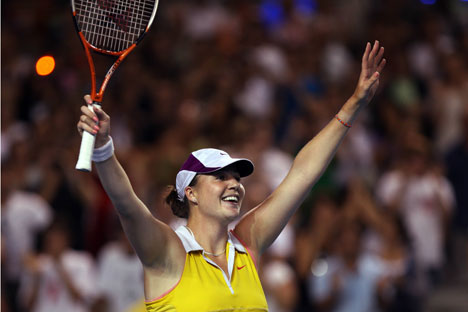
Alisa announced her disease two years ago, on her 22nd birthday. She made the announcement in an open letter on the WTA website. The message finished with the words: "I'll be out of tour for some time, but we shall see each other soon." And a smiley-face at the end. Source: Imago Sport/Legion Media
The Kremlin Cup that is currently being held in Moscow is worth visiting, at least to cheer for Alisa Kleybanova. The athlete faced a terrible diagnosis two years ago—Hodgkin’s lymphoma. Kleybanova asked only one question in response: "So, how can we manage it?" Following two years of chemotherapy and droppers, Alisa is on the court again and hoping for great victories. The Moscow News met Alisa Kleybanova to find out how cancer—the most dreadful of adversaries—can be overcome.
"You see, I love being amongst players, at the tournament," Alisa says, smiling. "I feel right at home now. I think of matches only and try to have a positive view of the surrounding world. It's understandable that there will be wins and losses on the way, but I will struggle to be back in my former position. I have no restrictions as regards training, and my schedule is absolutely ultimate."
During the summer, Alisa hoped to participate in Wimbledon, but she was refused in the wild card by the English, who preferred to invite their own players. As a result, Alisa's first performance in the Grand Slam was at the U.S. Open. Now the athlete is set for her really big return—she is already in the Kremlin Cup quarterfinals.
"I'm grateful to Kremlin Cup hosts for their support, as my current rating would not allow me to take part in it," Kleybanova says. "Am I bitter about Wimbledon? No, it is far from being the only refusal this year. Such things do not surprise me any longer. I put up with the fact that I would have to make up the lost ground, counting easy times out. That's exactly why I value the wild card so much at a home tournament."
Alisa announced her disease two years ago, on her 22nd birthday. She made the announcement in an open letter on the WTA website, in which she revealed that she was taking treatment in Perugia, Italy, in the bosom of her family and friends. The message finished with the words: "I'll be out of tour for some time, but we shall see each other soon." And a smiley-face at the end.
"I didn't want to disclose it during tournaments, to avoid an unnecessary stir," says Alisa. "Everything was unexpected, and I was not prepared, at first, to tell the whole world what’s happened. I had to take care of all the problems; it took some time to find the disease, too. But when I played at neither Roland Garros, nor Wimbledon, it was already impossible to keep fans in the dark. We didn't want rumors, so we were waiting for a right chance."
Julian Vespan, Alisa's coach, remembers that he was shaken to learn about the athlete’s diagnosis. Kleybanova herself was quiet: "So, how can we manage it?" was the only thing she said.
By that time, Alisa had felt bad for a long while already and struggled against cold symptoms. The tennis player decided to undergo treatment in Italy. It happened that one of the best cancer centers in Europe was near her Perugia home. She did not even have to pay for the treatment; it was covered by insurance.
"They had no special program there: I did chemotherapy once a fortnight, and I was at home for the rest of time. Analyses, droppers, and analyses again—everything was rather pragmatic, monotonous ... and unpleasant, especially with my hair falling out," Alisa says, allowing a smile while recalling the difficult time. "I had to forget about training for a year nearly. No loads are compatible with such a treatment to any extent—there is a risk of developing heart disorders, and returning to sports would be out of the question then."
Alisa totally disappeared from sports during her rehabilitation and minimized contacts with journalists. While in Perugia, she was visited by Ekaterina Makarova and Vera Zvonareva. Martina Navratolova, who also overcame cancer, passed on words of encouragement, too. WTA conducted a campaign in support of Alisa, during which thousands of letters were received by the recovering athlete.
Alisa made an effort to return to the court last year, but she admits now that it was too early. After returning, Kleybanova won her first match at a Miami tournament, but she was unable to do anything more. Having failed to qualify for the tournament in Rome, Alisa declared her career to be on pause again, due to the necessity of looking into her recovery with more care. Kleybanova finally returned to tennis this season. A new stage in her career started in the American town of Landisville, in a tournament with $10,000 as the prize fund.
"Some months ago, I was the 900th, while now [I am] the 250th already. That's at least some sort of rating and possibility of playing in a sufficient number of tournaments," Alisa says. "Let it be hard, I'm ready for it. It's impossible not to worry after such a long break, but we are on the right track, having started with ‘minor’ tournaments. I was less nervous and perceived what was going on as a training competition. I didn't know at that moment at all whether I was ready to play match after match, so some time to hit the ground was needed."
Having gone through a very complicated period in her life, Alisa says that one word helped her manage the disease—the word "patience." And her belief in a positive outcome went a long way in helping, as well.
First published in Russian in Moskovskie Novosti.
All rights reserved by Rossiyskaya Gazeta.
Subscribe
to our newsletter!
Get the week's best stories straight to your inbox